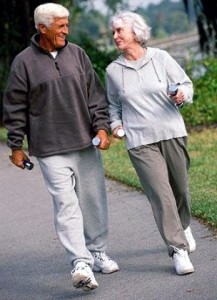
OSU researchers studying declining mobility in aging have found that the more older people worry about their health, the less active they are likely to be. And the less active they are, the more difficulty they have walking.
According to Kin-Kit Li of the University of Hong Kong who received his PhD from OSU in 2008 “Health professional’s warnings of disease or premature death to promote physical activity can actually have the opposite effect.” It’s a self defeating cycle. Walking is one of the best forms of physical activity for the aging population, but the study shows that the more that people worry about their health, the less likely they are to walk or participate in other physical activity.
Professor Bard Cardinal, co-author of the study along with Sam Vuchinich says “Our research shows that a key component to avoid walking difficulty in older adults is to resolve health worry issues earlier in life.” The research was published the Research Quarterly for Exercise and Sport.
 According to the study, the elderly are better motivated through positive influence.
According to the study, the elderly are better motivated through positive influence.
“Our research suggests that using threats and fear tactics to encourage physical activity in older adults will not work,” Cardinal says. The study suggests that health-related information should include appropriate self-regulation and coping strategies for health worry. Instead of using health threat as a motivator, evidence-based programs for behavior change should be used.